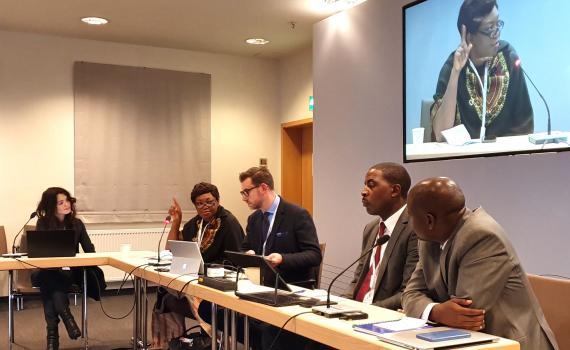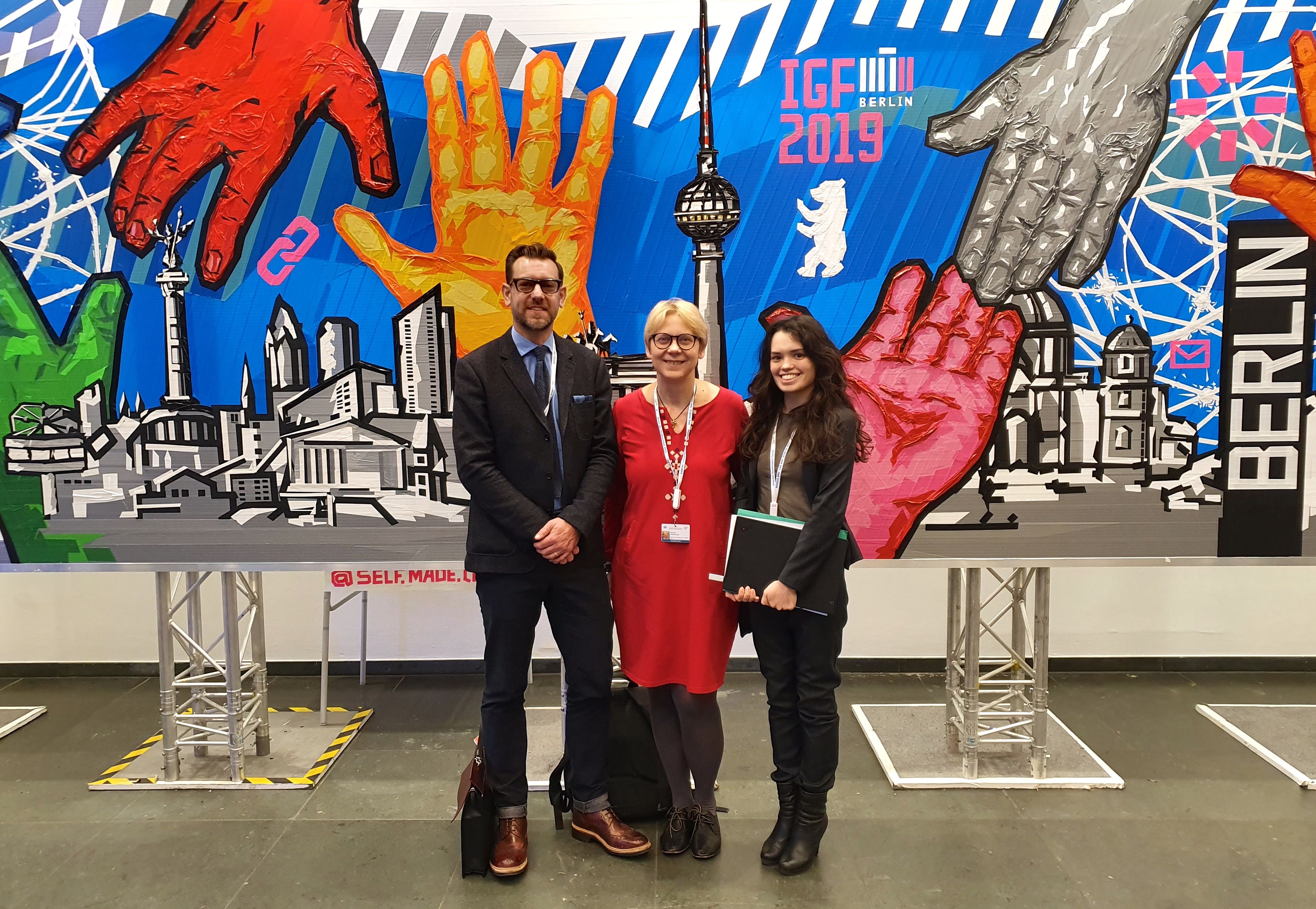
Digital inclusion was one of the main themes at the Internet Governance Forum (IGF) 2019 in Berlin (25 - 29 November), presenting opportunities to highlight the role of libraries in providing meaningful access to the internet. Ramune Petuchovaite, EIFL Public Library Innovation Programme Manager, shares highlights from the event.
This year’s IGF, with the theme,‘One World. One Net. One Vision.’ attracted over 6,500 delegates - 3,600 people travelled to Berlin in Germany from all over the world to take part in person and another 3,000 registered for webcasts and online discussions. In 200 lively sessions delegates from governments and intergovernmental organizations, and the business, technology, civil society and media sectors met, shared ideas and debated issues relating to the three overarching topics of IGF 2019: Data Governance, Digital Inclusion, and Internet Security, Safety, Stability & Resilience.
Meaningful access - not just connection
Over a quarter of the sessions focused on digital inclusion, and this was an opportunity for us to bring libraries into discussions. Well-equipped libraries in developed countries have been offering public access to computers and the internet since the 1990s. Today growing numbers of libraries in developing countries are also getting connected and assuming new roles - building technology and digital literacy skills in their communities; providing access to e-resources and other online content, and integrating technology into innovative services.
Presentations and discussion at the forum made it clear that digital inclusion remains a critical issue. Several speakers noted that adoption of the internet was slowing, especially in low-income countries, raising concerns about a deepening digital divide and fears that the UN Sustainable Development Goals for connectivity would not be achieved by the target date of 2030.
“Digital technologies, depending on their use, can be a force that widens social gaps or reduces them,” stressed UN Secretary-General Antonio Guterres in his opening address. He said it was alarming that today some 3.6 billion people (a little less than half of the world’s population) had no affordable internet, and were missing out on the transformative impact of the internet. 
Connections must be meaningful, Sir Tim Berners‑Lee, a founding director of the World Wide Web Foundation, told a High Level Panel. According to Berners-Lee, meaningful access is more than just having any kind of connection; it is a complex concept that embraces reliable and affordable internet, the capacity to use it, and availability of local content and services.
Speaking during an introduction to the theme of Digital Inclusion, Doreen Bogdan-Martin, Director of the ITU Telecommunication Development Bureau, referring to the recommendations of the ‘State of Broadband Report 2019’ released in September 2019, said: “Libraries, of course, are a great place to bring communities in and we've seen some interesting examples of well-connected libraries bringing in communities and being able to roll out other sorts of e‑government services.”
How are libraries included in national broadband strategies?
We organised a one-hour meeting of the Dynamic Coalition on Public Access in Libraries (DC-PAL), which was co-created by EIFL and IFLA, to look into the ‘State of Broadband Report 2019’ more deeply and to analyse the ways in which libraries are included in national strategies.
Opening the session, moderator Dr Stuart Hamilton, Head of Libraries Development at the Local Government Management Agency in Ireland, reminded delegates about the huge potential of libraries to tackle digital inclusion: “We have over 400,000 public libraries worldwide, and I don't think there is another stakeholder within the UN conversations, maybe except for post offices, that actually have over 400,000 physical space points. All over the world libraries can be utilized to increase access,” he said.
A study jointly conducted by IFLA and EIFL for the DC-PAL identified more than 30 countries worldwide that include libraries in their national broadband strategies and plans. Analysis found that these national policies recognize the potential of public libraries to contribute in four ways:
- Public access to bridge the digital divide, support vulnerable groups and facilitate access to e-government services and participation in online digital economy.
- Digital literacy and ICT skills, engaging libraries in helping users to use computers and the internet, and in implementing national digital literacy initiatives.
- Support for educational institutions and broader educational goals, such as providing access to e-learning, or digitizing educational materials.
- Digitization and content creation in local languages.
EIFL invited speakers from Kenya and Uganda representing the agencies in charge of Universal Service Funds (USFs - the bodies responsible for ensuring that communications services reach even the most remote and marginalized communities) to address the session about their experiences in partnering with national library authorities.
The Kenyan government has equipped all 62 public libraries in the Kenya National Library Service network with computers and the internet for free public access, and a similar initiative has begun in Uganda.
“We have seen an increase in the number of internet users in those libraries. Students and other community members are using their libraries to access digital content and to use e‑government services like applying for passports, identity documents or filing tax returns,” said Paul Kiage, Deputy Director of the Universal Service Fund at the Communications Authority of Kenya.
EIFL contributed to the partnership between the Communications Authority of Kenya and the Kenya National Library Service by building librarians’ digital skills to enable them to make the best use of the new technology.
In Uganda, the government, the National Library of Uganda and EIFL are working together to increase public access to the internet through public libraries and improve librarians’ technology skills. “People don’t have access and they are not using the internet. Some cannot afford to pay for the internet; others lack skills, especially in rural areas. We have seen the potential of public libraries as places where people can access the internet and learn digital skills,” said Emmanuel Muyomba, Project Manager of the Uganda Communications Commissiion’s Rural Communications Development Fund (RCDF).
The situation in Uganda is different from Kenya, Muyomba explained: the RCDF is less well resourced and the country is poorer. “The Uganda Communication Commission is pleased with the results of equipping13 public libraries, but it will take a longer time to equip all 45 public libraries in Uganda.”
The DC-PAL partners are planning further research to determine whether, and how, the national broadband strategies that include libraries are being implemented in the 30 countries. Case studies documenting policy implementation, including examples of public library contributions to meaningful internet access, will be presented at IGF 2020.
Librarians! Get involved in IGF discussions and activities!
IGF 2020, with the theme ‘Internet United’, will take place in Poland from 2 - 6 November, and digital inclusion and public access are sure to be discussed again.
In the run-up to the global forum, there are national and regional IGF discussions, where stakeholders - government officials, business, researchers, educators and civil society - meet to debate the relevant issues and contribute to the agenda for the global forum.
These national and regional IGF meetings present a great opportunity for librarians to meet directly with policy makers and to raise awareness about what libraries are doing to extend meaningful connectivity in their communities, and to ensure that libraries continue to be included in national broadband strategies and plans.
You can find out more about IGF activities in your country here.
Congratulations to Anriette!
Congratulations to Anriette Esterhuysen, human rights and internet activist from South Africa, and long-time leader (currently senior advisor) of the Association for Progressive Communications (APC). Anriette has just been appointed Chair of the IGF’s Multistakeholder Advisory Group, the body which advises the UN on the programme for IGF meetings. Anriette has been a good friend to EIFL, energetically supporting public access to the internet through libraries for many years.
Find out more about IGF 2019
SHARE / PRINT







